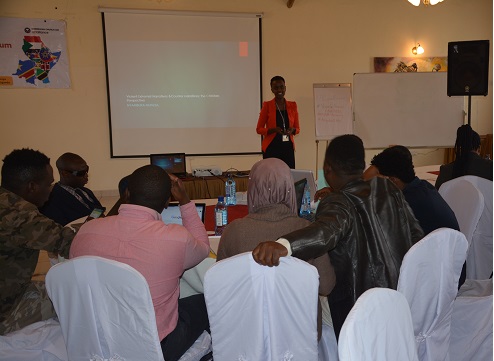
Radicalization is a process that pushes individuals to engage in violent extremism stated Ms. Nyambura. Having a critical mind is not wrong, Galileo for example was criticized by his contemporaries for his ideas especially on the rotation of the earth. Galileo was correct but he was condemned for it. Radicalization then depends on the period when an idea was being preached. It is difficult for a single situation to push an individual to adopt violent extremism. It is rather a series of events and situations that push an individual towards adopting violent extremism.
People with weak or lose family and social bonds are easily converted to become extremist. This is because they believe that such activities will bring meaning to their lives. They believe that the love which they were not able to receive from their families and friends will be given to them by the new family which is the terrorist cell.
At the same time individual personal needs can lead them to radicalization. The need for love and affiliation, need for power, need for recognition are among the drivers which influenced individuals into being radicalized. These needs coupled with grievances give those who adopt radical ideas a sense of justification for their crimes.
According to Ms. Nyambura, narratives like brotherhood, collective identities, personal identities push individuals toward radicalization. When individuals claim a collective identity, whenever something is wrong with any of them, the whole group feel it is their responsibility to avenge the crime. This blind faith in the other is a serious challenge in preventing violent extremism.
Sharing their experiences based on a video, participants stated that radicalization in most cases is due to ignorance. People are in most cases misinformed about the other. Prejudices about the other, about a particular religion, people, and tribe are always motivators to hate leading to violent extremism. The propaganda which is propagated by the media misinforms people and affect their perception of the other. These perceptions then fuel radicalization. Radical groups then use these perceptions coupled with the suffering of the people and their misfortunes to recruit them into terrorist cells. However, many participants stated that violence cannot be used to fight violence.
It is therefore imperative to develop counter narrative which are peace oriented. These counter narratives can be interfaith and interethnic narratives that will challenge the common narratives that challenge peace in communities. There is need to also develop religious counter narratives. She concluded that counter narratives can only be successful when we give conversation a chance. We have to interact with others from different cultures and backgrounds so that we can begin to change our perceptions about the other.